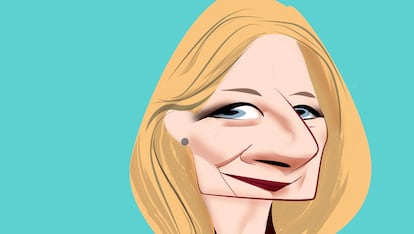Lisa Randall, the theoretical physicist who wrote an opera about the fifth dimension
The professor at Harvard and researcher of other dimensions is one of the scientists who has raised her voice against Trump’s cuts

The ideas of theoretical physicist Lisa Randall, who specializes in particle physics, gravity, and extra dimensions, have had a major impact on modern cosmology. Before joining Harvard — the university where she earned her doctorate and has spent the last 25 years teaching — she publicly presented the Randall-Sundrum model in 1999, alongside Indian-U.S. scientist Raman Sundrum. The model gained widespread popularity by proposing the existence of extra dimensions (in addition to the three spatial and temporal dimensions we know) to explain why gravity is so weak compared to other forces, something that Einstein’s theory of general relativity had failed to explain.
In this sense, her theory complemented Einstein’s, based on the principles of quantum mechanics. Interestingly, both Einstein and Randall were almost the same age when they developed their theories — 36 and 37, respectively. These days, Randall’s name is in the pool of those who could be nominated for a Nobel Prize in Physics, and her hypotheses remain relevant, such as the one she develops in her book Dark Matter and the Dinosaurs (2016), where she suggests that dark matter could have triggered the cataclysm that wiped out the dinosaurs.
She’s currently concerned about how the Trump presidency could affect research and has spoken out against the cuts imposed by the new administration. Harvard recently lost $450 million in grants, in addition to the $2.2 billion the government had already frozen.
She’s “ambitious, enthusiastic, and energetic, with a keen eye for identifying lines of research that could lead to important discoveries, yet cautious and meticulous about the process,” explained Sundrum, a colleague on her most important theory to date, via email. He considers Randall “a whirlwind of instinct, speed, and boldness.” A point echoed by physicist Andrea Karch in Scientific American magazine: “When she says things that don’t make sense, my first thought is, ‘she’s crazy.’ But I don’t say anything because she’s almost always right. Lisa just knows the answer.”
Randall’s father was a salesman for an engineering firm, and her mother was an elementary school teacher. Lisa grew up as the middle of three sisters at a time when education in New York wasn’t the best. “I had to take every opportunity I had seriously; I didn’t take anything for granted,” she explains via video conference just after 9 p.m., after a busy day of meetings, seminars, and several projects she’s managing in parallel.
With a brilliant career trajectory, having become the first female theoretical physicist to earn tenure at MIT and Harvard, and at the pinnacle of science, she comes across as humble, approachable, and patient.
There’s no arrogance, prejudice, or disdain in her responses. In fact, one of Randall’s greatest contributions has been not only developing complex ideas that place her among the most influential scientists of the 21st century, but also making the colossal effort — which also requires talent — of adapting them to a popular format in her books so that any reader unfamiliar with scientific formulations can understand the scale of what is being discovered and theorized without feeling left behind. For example, what the monumental discovery of the Higgs boson, known as “the God particle,” entails.
Throughout her career, Randall has written four books, all of which have been translated into Spanish by the publisher Acantilado and edited by novelist Cormac McCarthy, a great science buff who eventually became her friend. Her debut, Warped Passages: Unraveling the Mysteries of the Universe’s Hidden Dimensions, was named one of the 100 best books of 2005 by The New York Times, and in 2007, Randall was included among Time magazine’s 100 most influential people in the world.
Shortly after, in 2009, she surprised audiences with an artistic twist that transformed her into a scientist with a surprisingly poetic voice. She accepted a challenge from an electroacoustic composition professor, Hèctor Parra, and wrote an opera libretto, Hypermusic Prologue: A Projective Opera in Seven Planes, in which the protagonists enter the fifth dimension. “This landscape…? / This stage of our being? / Where is it? / Where does it end? / The structures sustain existence / Can I find them? / [Or are they] / riddles I’ll never decipher from here? / Anguish / Distortion. Agony.”
The opera premiered at the Centre Pompidou in Paris and later at the Liceu in Barcelona. “I’ve always been interested in spreading science, and art seems like a good channel to do so,” explains Randall.
She smiles, flattered, at the possibility that this first foray into libretto writing could lead her to write a good book of poetry. “I’ve never tried to write a poem,” she says, her eyes shining. She seems open to anything; you just have to challenge her. In 2011, she even co-curated (with Lia Halloran) an exhibition in Los Angeles on scale works, a concept that interests both artists and scientists. “I love coming up with new ideas and doing my best to develop them,” she explains, emphasizing that to be a scientist, you also have to be creative.
Randall has built an independent life; she’s never married, has no children, and her interests go far beyond science. She surfed until she injured her knee, scuba dives, and is passionate about climbing. “I love being outdoors solving problems. It’s fun; sometimes there’s real risk, and other times it just seems risky,” she says.
Now, she mostly plays tennis and confesses that in March she attended an event on machine learning, robotics, and space, only because the activities included a tennis class with Toni Nadal, coach of Rafa Nadal among others. One of her first students when Randall was teaching at MIT, the Hungarian Csaba Csaki, now a professor at Cornell University, comments via email that in 2024 he organized a conference in Vietnam that Lisa attended along with other scientists, after which the group traveled around the country for a week. She was interested “in understanding the history and getting involved in the daily lives of the people there, as well as taking great photos,” Csaki says.
One of the greatest concerns facing theoretical physics today relates to what’s happening in the sociopolitical sphere. She was one of the scientists who spoke out publicly at one of the protests held in New York in March, under the slogan “Stand Up for Science,” denouncing the Trump administration’s cuts to scientific research. “They’re taking us backward. We’ve made so much progress. Why would we want to stop that progress and go back? Nothing is perfect, but trying to destroy things to improve them isn’t a good strategy,” she explains, noting that most of the postdoctoral students working with her are not Americans. “We scientists control diseases, we develop medicines... It’s completely reckless to intervene in this world the way they’re doing.”
Randall’s purpose seems to revolve around understanding and progress. Therefore, her conviction that there is nothing after death, that quantum physics has given false hope, and that we can trace the development of existence doesn’t deter her curiosity. She is interested in continuing to study supersymmetry, extradimensions, dark matter — the why and how of life.
Sign up for our weekly newsletter to get more English-language news coverage from EL PAÍS USA Edition
Tu suscripción se está usando en otro dispositivo
¿Quieres añadir otro usuario a tu suscripción?
Si continúas leyendo en este dispositivo, no se podrá leer en el otro.
FlechaTu suscripción se está usando en otro dispositivo y solo puedes acceder a EL PAÍS desde un dispositivo a la vez.
Si quieres compartir tu cuenta, cambia tu suscripción a la modalidad Premium, así podrás añadir otro usuario. Cada uno accederá con su propia cuenta de email, lo que os permitirá personalizar vuestra experiencia en EL PAÍS.
¿Tienes una suscripción de empresa? Accede aquí para contratar más cuentas.
En el caso de no saber quién está usando tu cuenta, te recomendamos cambiar tu contraseña aquí.
Si decides continuar compartiendo tu cuenta, este mensaje se mostrará en tu dispositivo y en el de la otra persona que está usando tu cuenta de forma indefinida, afectando a tu experiencia de lectura. Puedes consultar aquí los términos y condiciones de la suscripción digital.









































